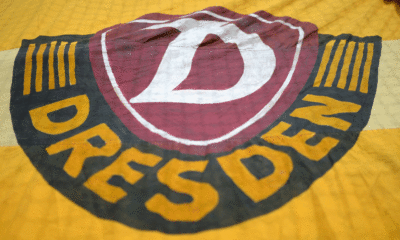Bundesliga
Why only the mandatory vaccination secures the Bundesliga
Published
3 years agoon
By
Maria Keane
The Bundesliga is starting its third Corona season and after the recent infections in several teams, doubts are growing whether regular games will be possible this time. Which is also due to the lack of consistency of the clubs in vaccinating. The football column.
The Bundesliga live on DAZN! Secure the free month now until September 30th!
Ironically, on Friday the 13th, the Bundesliga starts its third Corona season.
Will it get better, maybe even in the end the effects of the pandemic will no longer play a major role at all? As is well known, hope dies last.
But even a year ago, there was great optimism after a flattened wave in the summer and in view of the announced vaccine. The assumptions made by 1. FC Köln at the time are an example: 10,000 spectators were calculated up to March, then with a sold-out house and 50,000 fans by the end of the season.
Bundesliga negative record: average of 2900 spectators
As is well known, the reality was quite different: on the first six match days there were partial admissions at least in some stadiums, despite the increasing numbers, but in the end the average was only a measly 2900 visitors per match. This was followed by the nationwide shutdown, also for the Bundesliga, so that a few hundred supporters were only allowed in on the last day of the game.
Thus, 1. FC Köln finally had a total (!) Of 600 spectators for the entire season, which is a share of the maximum possible capacity in all home games of 0.0007 percent. Only Schalke 04 (300 spectators in total) and FC Bayern performed worse, who were allowed to let in 250 people after 16 games in front of empty stands at the championship ceremony.
Almost all clubs make double-digit million losses
Accordingly, the balance sheets of all clubs look bad: 73 million euros minus at Borussia Dortmund, 37 million minus at Eintracht Frankfurt, 28 million minus at VfB Stuttgart. And these are only the numbers from the 2020 annual financial statements, so the pandemic dragging trail of the second half of the year will drive the losses even higher.
At the start of the new season, after the Prime Minister’s Conference this week, the clubs have at least some planning security, because a maximum of 25,000 fans per game are allowed again for the time being. But only as long as the seven-day incidence does not exceed 100.
“Ten to twelve million euros loss for every 10,000 fans”
“This is a positive sign,” said Frankfurt’s board spokesman, Axel Hellmann. In the long run, however, that is not enough to survive: “For every 10,000 fans that we don’t have, we have to calculate a loss of around ten to twelve million euros.” An empty stadium costs the clubs between 1.5 and two million euros per game on average.
In view of these alarming facts, it is all the more incomprehensible that Hellmann has so far spoken out against more consistent access restrictions to the stadiums. In order not to enlarge the “rift through society”, Hellmann wants to continue to grant access to those who have been vaccinated and recovered, as well as to those who have been tested.
Cologne, Leverkusen, Dortmund: only vaccinated and convalescent
The said rift, however, also goes across the league. On the one hand, those responsible such as Hoffenheim’s managing director Jan Mayer, who speak out against the much-cited “mandatory vaccination through the back door”.
On the other hand, clubs like Borussia Dortmund, 1. FC Köln or Bayer Leverkusen, who only want to allow vaccinated and recovered people into the stadium. Only people who cannot be vaccinated for medical reasons are allowed to be tested.
According to the current status, the so-called “2G strategy” could prevail nationwide, because presumably only it enables a permanent return to full stadiums. On the one hand, experts assume that the fourth wave will inevitably spread in the coming weeks and months. That would certainly also lead to an exclusion from public events such as football games – but according to politics, it should not apply to vaccinated and convalescent people under any circumstances.
On the other hand, almost all known experiments so far show the great uncertainty of rapid tests, especially if they are not taken by trained specialists. This led to corona outbreaks during the EM games in summer or at music festivals, for example in the Netherlands. Only tested but unvaccinated spectators close to the stadiums are therefore a considerable risk of infection.
“2G strategy” in the league legally watertight
As long as the vaccination rate remains low and the number of infections therefore remains high, more and more first and second division teams will almost certainly opt for the “2G strategy” with a view to the empty coffers. From a legal point of view, such a decision is watertight for the clubs as organizers and hosts. At the same time, numerous clubs try to convince their fans to vaccinate with vaccination campaigns on site as well as free tickets and other gifts.
“For football, as for our society in general, there can only be a certain form of normality again if you convince as many people as possible to be vaccinated,” said Leverkusen’s managing director Rudi Völler. “Anyone who is not ready for this form of social solidarity must also come to terms with the possible consequences.”
Corona vaccination: The professionals lack consistency
It is all the more surprising, however, that Völler and his colleagues lack this consistency when dealing with their own professionals. Instead of immunizing their squad as quickly as possible and thus ensuring the greatest possible security for the health of the entire team as well as for the game operations and the associated income, everyone can do what they want with reference to individual freedom of choice.
There are certainly good arguments for this in a free society, but in view of the dangers of the pandemic, it is inconsistent and potentially damaging to business. A year ago, a third of the 36 DFL teams were on the verge of bankruptcy if the game had been suspended for just a little longer. Therefore, you should now use every chance to put an end to the ghost as best you can.


Test match tournament on free TV and live stream
In preparation for the upcoming start of the season in the 2nd and 3rd divisions, SpVgg Unterhaching is organizing a...


Test match on free TV and live stream
Third division club Dynamo Dresden are testing today against top Czech club Slavia Prague in preparation for the upcoming start...


When does the season start?
It’s warm and sunny outside, but you just want to watch football again? Then get in the mood for the...


You must be logged in to post a comment Login